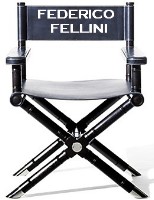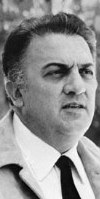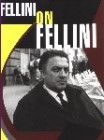 |
 |
Federico Fellini's name is recognized as one
of the icons of world cinema. He had no formal film training
and appropriately his cinema is steeped in personal expression and often imbued with carnivalesque fantasy as one of his more
colorful signatures. He repeatedly explored the
roles and relationships between unattached lovers, parents / children and
separating spouses. His admitted influences included preferences for Chaplin, Keaton,
and other comedians of that era as well as Luis Buñuel (admiring his biting
satirist films) preferring them to those currently recognized with him
as canons of the world cinema stage (Bergman, Dreyer, Kurosawa etc.). He was known
to have a volatile temper during the film shooting process - one which he
never disguised to outsiders on the set. He seemed to utilize this fervent passion as part of his
creative process. Constantly capturing public interest, his recognized
'muse', and wife of over 40 years (till his death), Giulietta Masina was
occasionally cast as his leading lady. |
|
Suggested Reading
(click cover or title for more
info)

Fellini on Fellini
by Federico Fellini, Isabel Quigley |
Official Fellini website
(in Italian)
Director - Selected filmography and review links:
The Voice of the Moon
(1990),
Ginger and Fred (1986),
And the Ship Sails On (1983),
City of Women
(1980),
Prova d'orchestra (1978),
Fellini's Casanova (1976),
Amarcord
(1973),
Roma (1972),
I Clowns (1970),
Satyricon (1969),
Juliet of the Spirits (1965),
8½ (1963),
Boccaccio '70 (1962),
La Dolce vita (1960),
Nights of Cabiria (1957),
Il Bidone (1955),
La Strada (1954),
I Vitelloni (1953),
L'Amore in Citta (1953),
The White Sheik (1952),
Variety Lights
(1950) |


![]()
